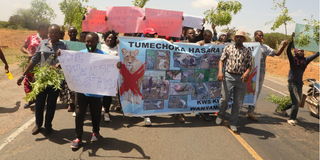Residents kill lions that preyed on livestock in Taita Taveta

Rong’e residents demonstrate along the Nairobi-Mombasa highway over killing of their livestock by lions.
Residents of Rong’e in Taita Taveta County have in the last two weeks speared to death four lions in a worsening case of human-wildlife conflict.
Due to the recent wild animal invasion incidents, Rong'e residents went to the streets to protest the killing of over 300 livestock in the last two months.
But their demonstrations along the busy Nairobi-Mombasa highway and in Voi town were interrupted by police who lobbed teargas to disperse them.
In retaliation attacks, the residents have silently killed four lions and wiped out evidence to prevent any interrogations by the police and the Kenya Wildlife Service (KWS).
Residents who spoke in confidence defended their move to eliminate the predators and said the attacks by lions have since minimised.
The residents accused the KWS of not doing enough to end the human-wildlife conflict and failing to respond promptly to their calls to remove the lions from the community areas.
"We are tired of losing our livestock to lions. We will not listen to anything coming from KWS. We will not continue losing livestock which is our only source of livelihood," one of the affected locals said.
Another villager said: "We sought a diplomatic way of resolving this issue but they lied to us and also they lobbed teargas on us and arrested some of our people. We will not talk to them again."
They said some residents have been rendered poor after their livestock were killed by the lions.
"We also fear for their lives because the lions are roaming freely in our villages," another villager said.
Captain Kennedy Ochieng, the KWS senior assistant director in charge of Tsavo Conservation Area, said investigations into the incident are ongoing to establish what could have transpired.
"We saw some fur on the spot where one of the lions was allegedly killed but we want to ascertain that it was indeed a lion that was killed. We were told that the residents ate the meat of the lions but we are yet to get full information on exactly which animals were killed," he said.
He said the KWS was working day and night to ensure that both the residents and wildlife are safe by resolving incidents of human-wildlife conflict that have become rampant in Taita Taveta.
"It could be that they killed a waterbuck because the fur does not match those of lions but we are investigating the incident," he added.
The drought that has hit most parts of the country has increased cases of human-wildlife conflict in Taita Taveta which neighbours Tsavo National Park.
Although the government relies heavily on proceeds from tourism for forex, to the residents, the human-wildlife conflict has rendered some of them poor with no compensation from the State.
Lions and elephants have strayed out of the park to the nearby homesteads, which led to the killing of livestock and destruction of crops.
Food security in the area is threatened with residents now depending on food aid to feed their families.
Mr Simon Mwamburi from Kirutai village is counting his losses after losing more than 20 goats to lions that had strayed from the park to his farm.
He is among thousands of residents in the county who continue to suffer losses every day due to invasion by either lions or marauding elephants that have now camped in the villages.
Mr Mwamburi told the Nation.Africa that he depended on his livestock to make ends meet but he was now poor.
"I don't have anything left. All my goats were wiped by the lions and the compensation is not forthcoming," he lamented.
In the Sagalla area, locals are living in fear following the recent trend of elephants breaking into their homes in search of food and water.
Last Saturday, Ms Majala Kitere said she heard a bang on her door while sleeping at around 11pm.
“I started screaming as the elephant tried to push its way inside the house through the small door. It then moved to the back of the house and started removing the roof,” she narrated.
She says the lone elephant has become a menace to the locals.
“I freaked out but I screamed and started beating cans to scare it away. My mother and my eldest son who live a few metres from my house heard the commotion and rushed to save me,” she added.
Anderson Keke, a village elder, said last week alone, five houses were broken into by elephants.
He said once the jumbos access the homes, they look for flour and water.
In November, an elephant died after it consumed a bag of cement in Kisimenyi village in the Kasigau area.
The residents had reported that the elephant was among a herd that broke into the home of one of the villagers and ate cement, maize and flour that were stored in the granary.
However, after the December rains, some elephants returned to the park but the escalating drought has now made them invade the community areas again.
Wundanyi MP Danson Mwashako wants the government to explain steps being taken to contain wild animals in Tsavo East and Tsavo West National parks in Taita Taveta county from invading human settlements.
Mr Mwashako has sought a statement at the National Assembly over the rampant invasions of wildlife in the area.
The MP wants Tourism and Wildlife Cabinet Secretary Peninah Malonza to state what her ministry was doing to contain the cases of human-wildlife conflict that have become rampant in Taita Taveta County.





